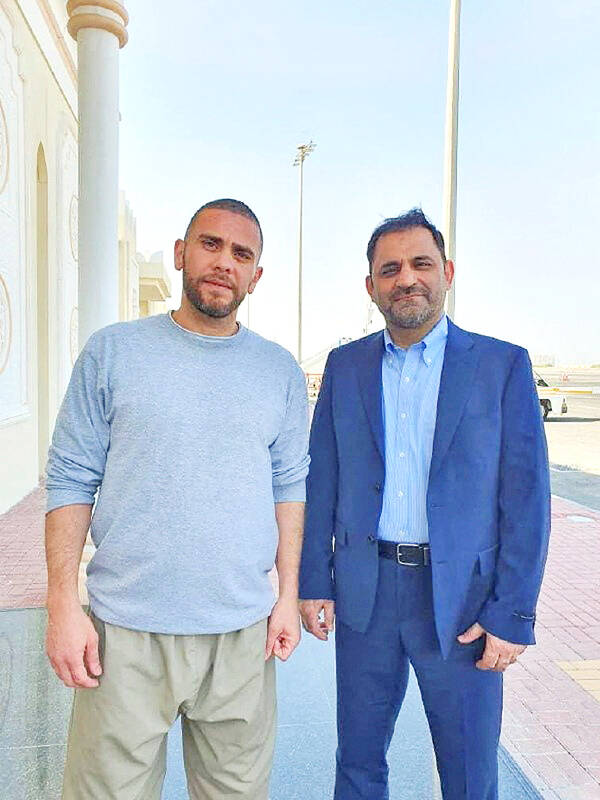Five prisoners sought by the US in a swap with Iran flew out of Tehran yesterday, officials said.
Flight-tracking data analyzed by The Associated Press showed a Qatar Airways flight take off at Tehran’s Mehrabad International Airport, which has been used for exchanges in the past.
Iranian state media soon after said the flight had left Tehran.

Photo: Reuters / NourNews / West Asia News Agency
Two people, including a senior US administration official, said that the prisoners had left Tehran. They both spoke on condition of anonymity because the exchange was ongoing.
In addition to the five freed Americans, two US family members flew out, the official said.
Earlier, officials said that the exchange would take place after nearly US$6 billion in once-frozen Iranian assets reached Qatar, a key element of the planned swap.
Iranian Ministry of Foreign Affairs spokesman Nasser Kanaani was the first to acknowledge that the swap would take place yesterday. He said the cash sought for the exchange that had been held by Seoul was now in Qatar.
Kanaani made his comments during a news conference aired on state television, but the feed cut immediately after his remarks.
“Fortunately Iran’s frozen assets in South Korea were released and God willing today the assets will start to be fully controlled by the government and the nation,” he said.
“On the subject of the prisoner swap, it will happen today and five prisoners, citizens of the Islamic Republic, will be released from the prisons in the US,” he added. “Five imprisoned citizens who were in Iran will be given to the US side.”
He said two of the Iranian prisoners would stay in the US.
Central Bank of Iran Governor Mohammad Reza Farzin later came on state television to acknowledge the receipt of more than 5.5 billion euros (US$5.9 billion) in accounts in Qatar. Months ago, Iran had anticipated getting as much as US$7 billion.
On the US side, Washington has said the planned swap includes Siamak Namazi, who was detained in 2015 and was later sentenced to 10 years in prison on spying charges; Emad Sharghi, a venture capitalist sentenced to 10 years; and Morad Tahbaz, a British-American conservationist of Iranian descent who was arrested in 2018 and also received a 10-year sentence.
All of their charges have been widely criticized by their families, activists and the US government.
US officials have declined to identify the fourth and fifth prisoners.
The five prisoners Iran has said it seeks are mostly held for allegedly trying to export banned material to Iran, such as dual-use electronics that can be used for military purposes.
The cash represents money South Korea owed Iran — but had not yet paid — for oil purchased before the US imposed sanctions on such transactions in 2019.
The US says that, once in Qatar, the money would be held in restricted accounts and would only be able to be used for humanitarian goods, such as medicine and food. Those transactions are allowed under US sanctions against Iran over its nuclear program.
Iranian government officials have largely concurred with that explanation, though some hard-liners have insisted, without providing evidence, that there would be no restrictions on how Tehran spends the money.

The CIA has a message for Chinese government officials worried about their place in Chinese President Xi Jinping’s (習近平) government: Come work with us. The agency released two Mandarin-language videos on social media on Thursday inviting disgruntled officials to contact the CIA. The recruitment videos posted on YouTube and X racked up more than 5 million views combined in their first day. The outreach comes as CIA Director John Ratcliffe has vowed to boost the agency’s use of intelligence from human sources and its focus on China, which has recently targeted US officials with its own espionage operations. The videos are “aimed at

STEADFAST FRIEND: The bills encourage increased Taiwan-US engagement and address China’s distortion of UN Resolution 2758 to isolate Taiwan internationally The Presidential Office yesterday thanked the US House of Representatives for unanimously passing two Taiwan-related bills highlighting its solid support for Taiwan’s democracy and global participation, and for deepening bilateral relations. One of the bills, the Taiwan Assurance Implementation Act, requires the US Department of State to periodically review its guidelines for engagement with Taiwan, and report to the US Congress on the guidelines and plans to lift self-imposed limitations on US-Taiwan engagement. The other bill is the Taiwan International Solidarity Act, which clarifies that UN Resolution 2758 does not address the issue of the representation of Taiwan or its people in

US Indo-Pacific Commander Admiral Samuel Paparo on Friday expressed concern over the rate at which China is diversifying its military exercises, the Financial Times (FT) reported on Saturday. “The rates of change on the depth and breadth of their exercises is the one non-linear effect that I’ve seen in the last year that wakes me up at night or keeps me up at night,” Paparo was quoted by FT as saying while attending the annual Sedona Forum at the McCain Institute in Arizona. Paparo also expressed concern over the speed with which China was expanding its military. While the US

SHIFT: Taiwan’s better-than-expected first-quarter GDP and signs of weakness in the US have driven global capital back to emerging markets, the central bank head said The central bank yesterday blamed market speculation for the steep rise in the local currency, and urged exporters and financial institutions to stay calm and stop panic sell-offs to avoid hurting their own profitability. The nation’s top monetary policymaker said that it would step in, if necessary, to maintain order and stability in the foreign exchange market. The remarks came as the NT dollar yesterday closed up NT$0.919 to NT$30.145 against the US dollar in Taipei trading, after rising as high as NT$29.59 in intraday trading. The local currency has surged 5.85 percent against the greenback over the past two sessions, central